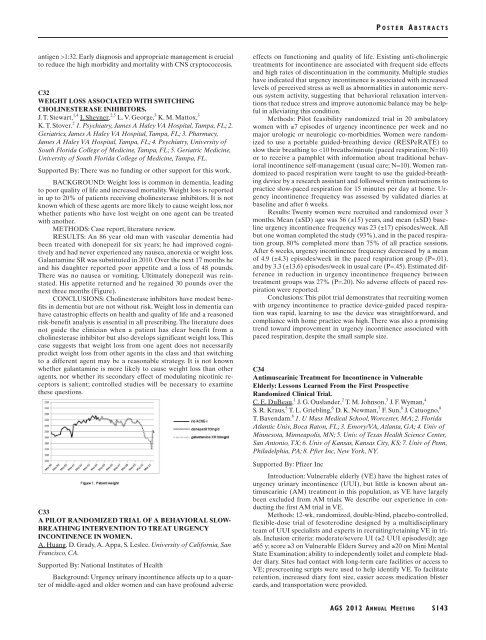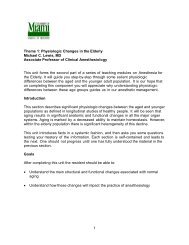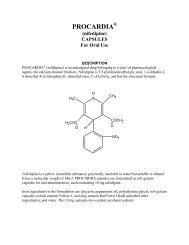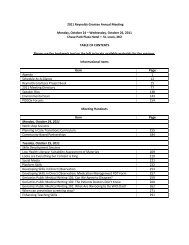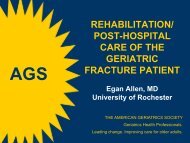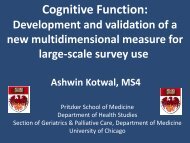Here - American Geriatrics Society
Here - American Geriatrics Society
Here - American Geriatrics Society
Create successful ePaper yourself
Turn your PDF publications into a flip-book with our unique Google optimized e-Paper software.
P OSTER<br />
A BSTRACTS<br />
antigen >1:32. Early diagnosis and appropriate management is crucial<br />
to reduce the high morbidity and mortality with CNS cryptococcosis.<br />
C32<br />
WEIGHT LOSS ASSOCIATED WITH SWITCHING<br />
CHOLINESTERASE INHIBITORS.<br />
J. T. Stewart, 1,4 I. Sheyner, 2,5 L. V. George, 3 K. M. Mattox, 3<br />
K. T. Stover. 2 1. Psychiatry, James A Haley VA Hospital, Tampa, FL; 2.<br />
<strong>Geriatrics</strong>, James A Haley VA Hospital, Tampa, FL; 3. Pharmacy,<br />
James A Haley VA Hospital, Tampa, FL; 4. Psychiatry, University of<br />
South Florida College of Medicine, Tampa, FL; 5. Geriatric Medicine,<br />
University of South Florida College of Medicine, Tampa, FL.<br />
Supported By: There was no funding or other support for this work.<br />
BACKGROUND: Weight loss is common in dementia, leading<br />
to poor quality of life and increased mortality. Weight loss is reported<br />
in up to 20% of patients receiving cholinesterase inhibitors. It is not<br />
known which of these agents are more likely to cause weight loss, nor<br />
whether patients who have lost weight on one agent can be treated<br />
with another.<br />
METHODS: Case report, literature review.<br />
RESULTS: An 86 year old man with vascular dementia had<br />
been treated with donepezil for six years; he had improved cognitively<br />
and had never experienced any nausea, anorexia or weight loss.<br />
Galantamine SR was substituted in 2010. Over the next 17 months he<br />
and his daughter reported poor appetite and a loss of 48 pounds.<br />
There was no nausea or vomiting. Ultimately donepezil was reinstated.<br />
His appetite returned and he regained 30 pounds over the<br />
next three months (Figure).<br />
CONCLUSIONS: Cholinesterase inhibitors have modest benefits<br />
in dementia but are not without risk. Weight loss in dementia can<br />
have catastrophic effects on health and quality of life and a reasoned<br />
risk-benefit analysis is essential in all prescribing. The literature does<br />
not guide the clinician when a patient has clear benefit from a<br />
cholinesterase inhibitor but also develops significant weight loss. This<br />
case suggests that weight loss from one agent does not necessarily<br />
predict weight loss from other agents in the class and that switching<br />
to a different agent may be a reasonable strategy. It is not known<br />
whether galantamine is more likely to cause weight loss than other<br />
agents, nor whether its secondary effect of modulating nicotinic receptors<br />
is salient; controlled studies will be necessary to examine<br />
these questions.<br />
C33<br />
A PILOT RANDOMIZED TRIAL OF A BEHAVIORAL SLOW-<br />
BREATHING INTERVENTION TO TREAT URGENCY<br />
INCONTINENCE IN WOMEN.<br />
A. Huang, D. Grady, A. Appa, S. Leslee. University of California, San<br />
Francisco, CA.<br />
Supported By: National Institutes of Health<br />
Background: Urgency urinary incontinence affects up to a quarter<br />
of middle-aged and older women and can have profound adverse<br />
effects on functioning and quality of life. Existing anti-cholinergic<br />
treatments for incontinence are associated with frequent side effects<br />
and high rates of discontinuation in the community. Multiple studies<br />
have indicated that urgency incontinence is associated with increased<br />
levels of perceived stress as well as abnormalities in autonomic nervous<br />
system activity, suggesting that behavioral relaxation interventions<br />
that reduce stress and improve autonomic balance may be helpful<br />
in alleviating this condition.<br />
Methods: Pilot feasibility randomized trial in 20 ambulatory<br />
women with ≥7 episodes of urgency incontinence per week and no<br />
major urologic or neurologic co-morbidities. Women were randomized<br />
to use a portable guided-breathing device (RESPeRATE) to<br />
slow their breathing to


